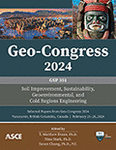Role of EPS Geofoams in Reducing Thermal Losses from Slab-on-Grade Foundations under Freezing Conditions
Publication: Geo-Congress 2024
ABSTRACT
Enhancing energy efficiency for attaining net-zero homes is a crucial subject that is of great interest for advancing sustainability and addressing the issue of climate change. Almost 43% of the annual energy bill of a typical US household is known to be accounted for by heating and cooling expenses. While there have been significant works on insulating the superstructure of a home, limited research work has been performed on insulating the foundations and substructures. A research study was designed and performed to examine the role and efficacy of expanded polystyrene (EPS) geofoam in insulating a slab-on-grade foundation system, a common type of shallow foundation where the concrete slab rests directly on the ground below it. Small-scale laboratory tests were conducted on a soil box with an insulated superstructure above a slab-on-grade foundation prototype. The performance of different thicknesses and installation configurations of geofoam insulations was compared to a control section with insulated superstructure and bare slab. The tests were performed inside a temperature-controlled environmental chamber set at −18°C. Thermocouple probes were used to monitor temperature profiles within the test setup. The insulated test sections were found to have consistently warmer slab temperatures compared to the bare slab conditions, and significant variation in performance was observed between the tested configurations. The configuration with insulation around the slab perimeter showed the best performance with over 10°C warmer indoor temperatures observed compared to the control section. The test results clearly indicated that the application of geofoam has significant potential in reducing the heat transfer between the foundation and the soil/air interfaces and therefore could lower the energy losses from residential homes.
Get full access to this article
View all available purchase options and get full access to this chapter.
REFERENCES
Al-Homoud, M. S. 2004. The Effectiveness of thermal insulation in different types of buildings in hot climates. Journal of Thermal Envelope and Building Science, 27(3): 235–247. doi:https://doi.org/10.1177/1097196304038368.
Asdrubali, F., D’Alessandro, F., and Schiavoni, S. 2015. A review of unconventional sustainable building insulation materials. Sustainable Materials and Technologies, 4: 1–17. doi:https://doi.org/10.1016/j.susmat.2015.05.002.
Bartlett, S., Bartlett, S., Kimble, M., and Sheeley, M. 2000. Use of geofoam as super-lightweight fill for I-15 reconstruction. In Transportation Research Board 79th Annual Meeting. Washington, DC.
Carmody, J., Mosiman, G., Handeen, D., Huelman, P., and Christian, J. 2013. Foundation Design Handbook. https://doi.org/10.2172/112501.
Chen, Z., Hammad, A. W. A., Kamardeen, I., and Akbarnezhad, A. 2020. Optimising embodied energy and thermal performance of thermal insulation in building envelopes via an automated building information modelling (BIM) tool. Buildings, 10(12): 1–23. doi:https://doi.org/10.3390/buildings10120218.
Dodoo, A., Gustavsson, L., and Tettey, U. Y. A. 2017. Final energy savings and cost-effectiveness of deep energy renovation of a multi-storey residential building. Energy, 135: 563–576. Pergamon. https://doi.org/10.1016/J.ENERGY.2017.06.123.
EIA (US Energy Information Adminstration). 2023. Monthly Energy Review. Retrieved from: www.eia.gov/mer.
Horvath, J. 1994. Expanded Polystyrene (EPS) Geofoam: An introduction to material behavior. Geotextiles and Geomembranes, 13: 263–280.
Horvath, J. 1995. Geofoam Geosynthetic.Retrieved from: https://trid.trb.org/view/454426.
Insulfoam. 2021. Expert Advice: How EPS performs as below-grade insulation |.
Kossecka, E., and Kosny, J. 2002. Influence of insulation configuration on heating and cooling loads in a continuously used building. Energy and Buildings, 34(4): 321–331. Elsevier. https://doi.org/10.1016/S0378-7788(01)00121-9.
Krarti, M. 2011. Energy Audit of Building Systems: An Engineering Approach. (Second Edition). CRC Press.
Moussa, A., Shalaby, A., Kavanagh, L., and Maghoul, P. 2019. Use of rigid geofoam insulation to mitigate frost heave at shallow culvert installations. Journal of Cold Regions Engineering, 33(3). doi:https://doi.org/10.1061/(asce)cr.1943-5495.0000185.
Özer, A. T., and Akınay, E. 2022. Construction of geofoam block embankments atop existing transportation infrastructure. Geosynthetics International,: 1–19. ICE Publishing. doi:https://doi.org/10.1680/jgein.22.00284.
Puppala, A. J., Ruttanaporamakul, P., and Congress, S. S. C. 2019. Design and construction of lightweight EPS geofoam embedded geomaterial embankment system for control of settlements. Geotextiles and Geomembranes, 47(3): 295–305. Elsevier. https://doi.org/10.1016/J.GEOTEXMEM.2019.01.015.
Ramli Sulong, N. H., Mustapa, S. A. S., and Abdul Rashid, M. K. 2019. Application of expanded polystyrene (EPS) in buildings and constructions: A review. Journal of Applied Polymer Science (Vol. 136, Issue 20). https://doi.org/10.1002/app.47529.
DOE. 2020. Energy data facts. Available from https://rpsc.energy.gov/energy-data-facts. [accessed 19 March 2023].
Information & Authors
Information
Published In
History
Published online: Feb 22, 2024
ASCE Technical Topics:
- Architectural engineering
- Building insulation
- Building systems
- Concrete pavements
- Engineering fundamentals
- Foundation design
- Foundations
- Geomaterials
- Geotechnical engineering
- Infrastructure
- Measurement (by type)
- Pavements
- Shallow foundations
- Slabs
- Structural engineering
- Structural members
- Structural systems
- Structures (by type)
- Superstructures
- Temperature effects
- Temperature measurement
- Transportation engineering
Authors
Metrics & Citations
Metrics
Citations
Download citation
If you have the appropriate software installed, you can download article citation data to the citation manager of your choice. Simply select your manager software from the list below and click Download.
